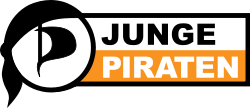This article has multiple issues. Please help improve it or discuss these issues on the talk page . (Learn how and when to remove these messages)
|
| Young Pirates Junge Piraten (JuPis) | |
|---|---|
 | |
| Secretary General | Yannick Schuerdt |
| Treasurer | Enno Tensing |
| Founded | 18 April 2009 |
| Headquarters | Berlin |
| Ideology | Pirate politics |
| Mother party | Pirate Party Germany |
| International affiliation | Young Pirates of Europe, Pirate Parties International |
| Website | www.jungepiraten.de |
| Part of a series on |
| Pirate Parties |
|---|
 |
Young Pirates (German : Junge Piraten, JuPis) is a youth organisation of the Pirate Party of Germany. The organisation was founded in Wiesbaden on 18 April 2009, when the first board of directors was elected. [1] Then-15-year-old Carmelito Bauer was the first elected chairperson. Since then the board is elected yearly by the present members on their federal meeting. At the first federal meeting of members in 2009 the construction of the board of directors was changed. Since then it has included seven board members, the chairperson and its deputy, the secretary general, the treasurer as well as three assessors.
